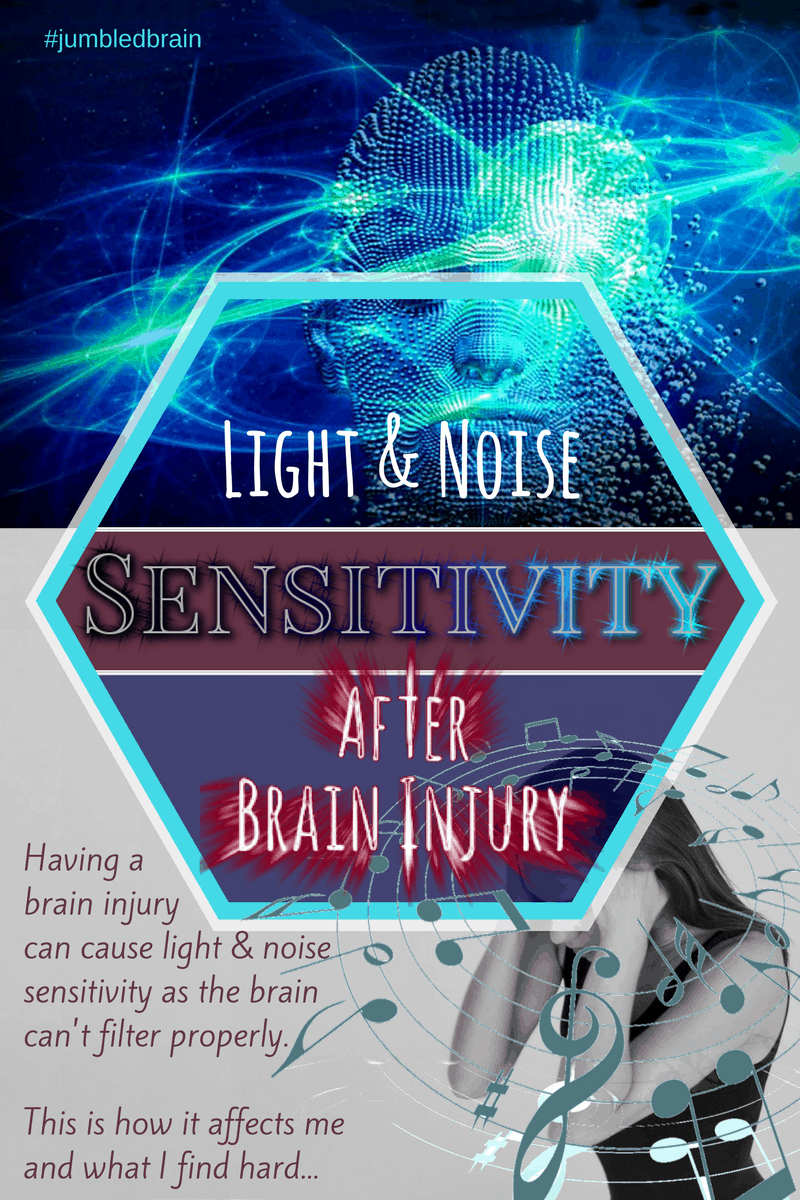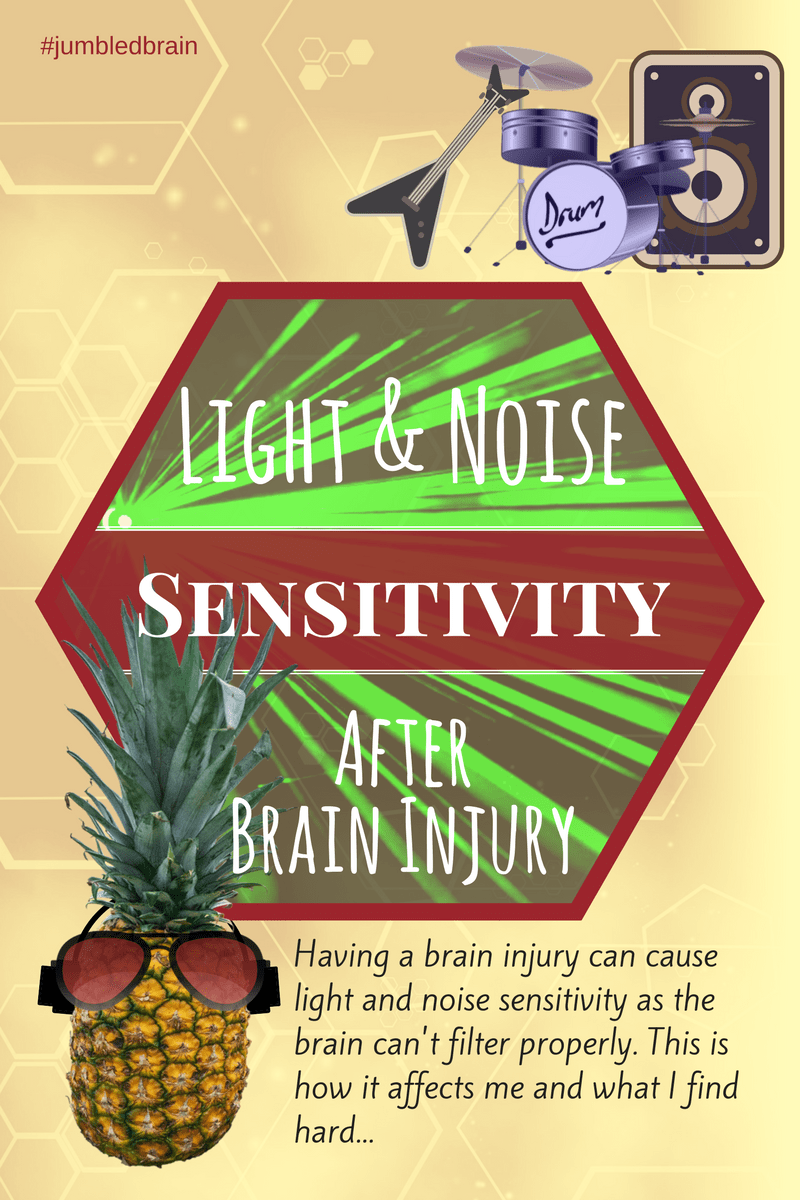
Busy places can be difficult for anyone who isn’t feeling well, but they can be a total nightmare if you have a brain injury. Usually our brain filters out a lot of information that it considers unnecessary, but many of those with a TBI find those filters aren’t working.
This sensitivity can cause over stimulation and be overwhelming.
One day James’ parents had come to see us, which is a long laborious drive for them. So first we had them relax with a cup of tea. We had a good catch up and although I do find visitors take up a lot of mental energy I thought I was doing alright.
We went out for dinner, and the restaurant was pretty busy. They were playing music to give the place an upbeat feel, but the table they sat us at was right underneath one of the speakers.
I was trying so hard not to make a fuss but all the chatter from the other dinners and the music left me unable to follow any conversation. It was so uncomfortable and I knew I must have looked like a sulking teenager. But I felt I was being polite by not storming, out as I was drowning in sound. At this stage I couldn’t think properly, and we should have just moved tables to a quieter spot. But I thought by saying “no I’m fine here, don’t worry” that I was helping. Clearly it wasn’t.
My mood kept getting worse as I continued to struggle with how the noise was making me feel. When the food arrived I could barely touch it. The sensation of feeling it in my mouth and taste was just extra input for my already completely overloaded brain. I found I had to just stare into nothingness and not even try to hide that I wasn’t paying any attention to anyone. I was acutely aware that I was being rude but it genuinely was the best I could do. But everyone was fine about it, and I was just relieved when we went home so I could try to recover.

But it’s not just noise I can struggle with. Light can be painful for my eyes. Sensitivity to both light and noise can be disastrous.
On a bright summer’s day, or a winters morning, when the sun is low and straight in your eyes we all can struggle and be reaching for the sunglasses. But I find being indoors can affect me too. The strip lighting in some supermarkets is devastating for me.
As for the dentists chair, that’s another story. I have to shut my eyes due to my light sensitivity . Then they keep asking if I’m OK, because they aren’t getting any visual cues from me, even that I’m still conscious. So I make the eh-huh noise, as you can’t speak when you have all their equipment in your mouth. Coupled with being in the chair I get so dizzy that I’m no longer certain if I’m managing to stay still for them. But I’ve had no complaints from them so I can only assume that I do.
So I can find myself wearing my shades in what looks like odd places. I’m not trying to look cool, I’m just trying to stay sane! But knowing that I might look unapproachable, or as if I’m some celeb wannabe, also makes me feel awkward. I know I put too much effort into trying to second guess what others are thinking of me, when in fact they probably haven’t even noticed I exist.
If I don’t wear shades, as well as the pain, I can become dizzy and confused. All together it’s a crushing combination and can mean the only solution is to go lay down in a darkened room. It makes everyday life such hard work at times.
I have to shut the world out because my brain keeps letting too much of it in.


For more on senses being affected by brain injury try:

14 replies on “Dealing with light and noise sensitivity after brain injury”
Sound noe light. Which is fortunate as I live in a sunny place. I excuse myself. People are becoming accustomed to it
Absolutely, when people know I find they are more than accommodating.
Most people would love to live somewhere sunny, but when it’s causing you discomfort it’s a different story.
Hope your continued recovery goes well. Thanks for sharing your experience.
I have PCS since October 2015, and still light and sound sensitive. I don’t need my sunglasses inside the house that often anymore, but tilt my venetian blinds so there is no direct sun in the windows. I ALWAYS wear them outside, often even if it is cloudy. I only take them off when I’m away from home if it looks too dark. Then it is also easy to close my eyes when I need to rest them and no one can tell.
I use noise cancelling earbuds or my musician earplugs which are better for places where I need to have conversation. In restaurants I always ask for a table in a corner and sit with my back against a wall. I tell the hostess person that I have a hearing problem. That seems to work. I also usually go for lunch late after most people have left, or supper very early before people come. That seems to help, too. If a place has loud music, I just say we have to go somewhere else. It isn’t worth it to pretend it is ok. If people can’t deal with that then they don’t have to hang out with me! Take care of yourself. Do what is good for you! No guilt!
Thanks Elisa, you’re absolutely right. I need to put more planning into it like you do. I like how you tell staff you have a hearing problem, using terms that they’re more likely to understand.
i think I’m not self-aware enough to know what is stressing me, but I’m permanently tense & anxious.
We rarely go out, avoiding noisy places at all costs & I take me ear plugs with me too.
Noise is just so intrusive. It makes me feel like my head is going to explode. Earplugs is a good idea.
I am wondering how long after your initial injury you continue to experience these side effects? I am 16 months post injury and find these things worse now than initially. Or maybe I just don’t remember as much from the initial months. I find it most distressing to go backwards but maybe this is my new normal?
Hi Maxine. I believe that rather than we go backwards, we regain enough insight to suddenly be able to recognise some of our symptoms. A neurologist told me that offer survivors don’t report symptoms until months later because their brain has so much to contend with they just can’t process all of them at the same time. He told me this when I said I’d started having double vision months after my accident, and he was explaining how it was probably there immediately but I didn’t have the capacity to notice. So in a weird way it’s just a sign that you are still recovering.
I had a TBI back in 2003. I was 34 years old. I couldn’t drive for 3 years because it requires too much brain power to focus on and process everything you have to (i.e. cars in front of you, behind you, and beside you. Plus how fast you’re going, when to begin to make a turn. There are SO MANY things.
Eventually, I regained enough, mentally, to be able to drive again. Even so, I can only handle a certain amount of stimulation. Tool many conversations or too many subjects in a conversation can be overwhelming.
I’ve learned to just tell someone it’s too much for me. I either go somewhere else quiet or, if the person understands my need, they’ll take the subject one thing at a time. It helps. Now that I’m so past the stroke, I’m not as embarrassed by it most of the time. Getting to this point takes a lot longer than we want it to, but don’t give up.
For necessary errands I try to make a list and only go where I have to go to get what I need. Grocery store. Pet food store. Post office. I keep my eyes down and do not engage in conversation. At the checkout stand, I pick up one of the magazines and pretend I’m reading. I always have my payment method ready before going in to make checkout easier. Very different from the way I used to be, but it helps me survive this phase.
And I hope in time things start to move towards how you used to be. But your method is keeping you going for now and that’s what’s important.
I found a company called Theraspecs. The company created the glasses with a pink tint for people who suffer from migraines. The glasses I ordered in December have helped me heal tremendously.
Biosport acontact lenses have been helpful – purchase the Sun Tac tint which reduces overall brightness while preserving 100 percent normal color recognition such as with sunglasses. It has helped here treating light sensitivity issues—hope it will help someone else!
Thanks so much for this Tanya, I for one had no idea such a thing existed! They sound brilliant!